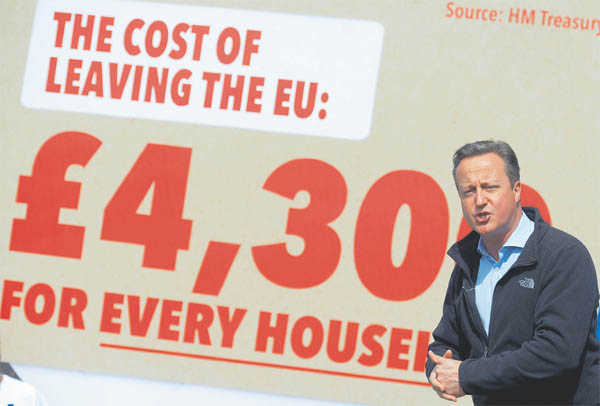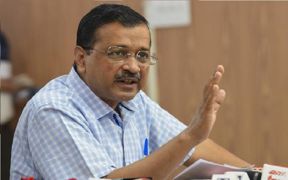
Toss-up: It would be foolish of the ‘yes’ camp to cry victory.
S Nihal Singh
AS Britain’s D-day approaches — the June 23 referendum on staying in or leaving the European Union (EU) — and partisan rhetoric grows shriller, it has essentially assumed the characteristics of a battle between the head and the heart. The head says stay and the heart says leave.
As reputed political scientists have been telling Britain, in an increasingly connected world, it makes no sense to leave the most important European institution since World War II. The United Kingdom benefits in trade and enjoys various other advantages from EU membership. What she gives up is formal sovereignty in a number of fields, particularly in the privileges EU citizens enjoy in the UK.
And it is here the heart element comes into play in the increasingly acerbic debate. Because Britain was once a great power, in fact the greatest imperial power of the 19th and early 20th centuries, she, even more than most other nation states, has always maintained a claim to exceptionalism and uniqueness, giving an almost divine air to these qualities. Ironically, she was among the victors of World War II but lost her empire to the winds of change and her influence and standing to the US.
For a time, Britain consoled herself with being something of a tutor to the all-powerful US in the arts of exercising influence in many corners of the world. But after the US picked up the threads, the UK became a mere camp follower of Washington, like many other countries, and was left claiming a “special relationship” with the US and sharing a common language.
The European Union Britain joined after initial rebuffs from the French has its own ironies. It is well recognised that Germany the UK, among others, had defeated in the war is the most influential member of the EU and helps set the rules governing certain aspects of laws the UK must follow.
In his overblown rhetoric, Mr Boris Johnson, the popular former mayor of London and Conservative member of Parliament and a proponent of the leave camp, likened the EU to Hitler’s failed attempt to unify and dominate Europe. The surprise was not in the avalanche of criticism he attracted, but by the number of fellow Conservatives who supported his far-fetched comparison.
What has given fillip to the leave campaign, despite claims that it would invite recession and loss of jobs and income, is immigration. Britain, which enjoys an opt-out clause on immigration issues, is not directly affected by the million-plus flow of refugees from war-torn Syria and other countries that have riled the other EU members. Rather, it is troubled by the number of Europeans, particularly from the eastern states, who have used their EU rights to settle in Britain and enjoy the generous benefits of her welfare state. As far as the bulk of the refugees is concerned, Britain’s Prime Minister David Cameron sat smugly after making a token gesture while other European nations quarrelled and fretted.
It might be surprising that the colonial past has come to haunt Britain rather late in the day — some purists even lament what Americans have done to English, increasingly the lingua franca of the world in its US variation. The truth is that many British Conservatives, more than one would imagine, never reconciled themselves to losing their empire and playing second fiddle to an upstart, so to speak, risen from the ranks. After all, the US in its earlier incarnation was a British colony.
Polls suggest that the question of Britain’s preference is still wide open, although apparently tipping towards the stay campaign. It is the hope of a large part of the British establishment that in the end people will decide that, despite the allure of a Britain sovereign in all respects, staying in the EU has logical force in the modern world, with the US still the sole superpower while China impatiently seeks similar status.
However, it would be foolish of the “yes” camp to cry victory. In a sense, Mr Johnson, with his cultivated folklorist ways and his upper class upbringing, is the essence of the appeal of the “no” camp. And this appeal goes to the bottom of the social scale, the groundlings in Shakespearian language. Britons may make fun of the snobs but they secretly admire them.
There is even a controversy surrounding the definition of Europeans. A section of Conservatives believes that Europeans of the continental variety are different from those belonging to the sceptered isle they inhabit. As proof, they say Europeans drive on the wrong side of the road and Germans in particular eat too much wurst.
Britain’s exit from the European Union would invite a host of problems. In his own warning, US President Barack Obama says it would take time to agree to a new trade treaty with Washington. On the other hand, the presumptive Republican candidate for US presidency, Mr Donald Trump, has been singing a different tune, seemingly encouraging the UK to go it alone. The problem, of course, is how far to take him seriously.
In a sense, we live in a disjointed world. The Trump phenomenon is above all a symbol of the frustration of the poor and middle classes over stagnant incomes while the rich grow richer. And in Europe, the rise of the right and tendency towards nativism in country after country is a sign of troubled tempers.
While the world is keeping its fingers crossed in the hope that the US as the sole superpower will get her sums right in the end, a possible Brexit from the EU would also impact the post-World War II architecture. One has only to go back a few centuries to discover the wars and strife that were the rule, rather than the exception, on the continent. This troubled history was, of course, aced by the Hitler phenomenon to plunge the world into World War II.



























